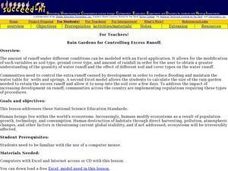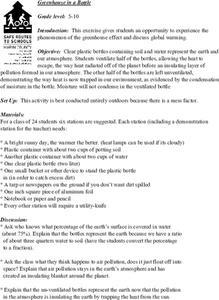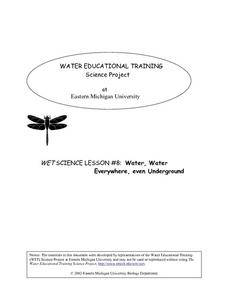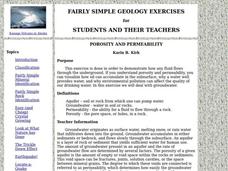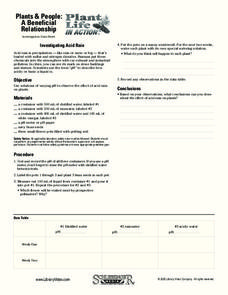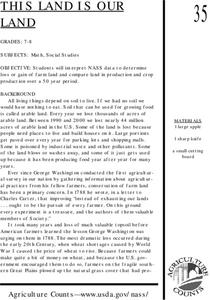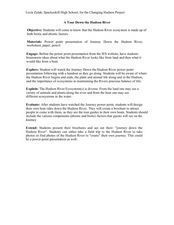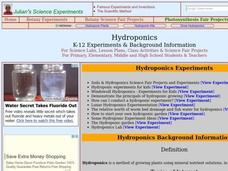Curated OER
The Marvels of Mud
Young scientists roll up their sleeves and get a little dirty in this three-day earth science investigation. Following the scientific method, children monitor the growth of algae in pond water samples in order to determine...
Curated OER
Rain Gardens for Controlling Excess Runoff
Students address the idea that human beings live within the world' ecosystems. They discuss how humans modify ecosystems as a result of population growth, technology, and consumption. Students discuss how the human destruction of...
Curated OER
Water filtration with Plants
Sixth graders explain how soil and plants effect contaminated water in nature. In this filtration lesson, 6th graders work in groups to test biofiltration units. Students determine which biofiltration units work best and how they...
Curated OER
Greenhouse in a Bottle
Students create models of the greenhouse effect using recycled 2-liter bottles. They discuss how their models compares to the real greenhouse effect the earth experiences.
Curated OER
Water Filtration
Students design a filtration system using three filtration materials. In this water filtration lesson, students conduct an experiment with their filtration systems. Students present their systems to the class. Group results...
Curated OER
Water, Water Everywhere, Even Underground
The "Engage" section of a wetlands lesson plan asks young ecologists to examine a wetlands poster. You can easily find one online and display it using a projector. Pupils immerse a piece of sandstone and a piece of granite in water to...
Chymist
Landfills and Recycling
Examine the nature of landfills through experimentation. Scholars build miniature landfills and monitor changes over a six-week period. Observations allow individuals to draw conclusions about the different types of trash and their...
Curated OER
The Breathtaking Nature of the Urban Explosion, Part 2
Students explore ozone levels. They measure the concentrations of ground-level ozone in the atmosphere. Students observe changes in the concentrations of ozone over time. Students complete a data sheet to record ozone readings over a...
Curated OER
Disposable vs. Reusable, Biodegradable vs. Non-biodegradable
Students examine and identify biodegradable and non-biodegradable materials. They discover ways in which biodegradable materials can help minimize pollution.
Curated OER
Porosity And Permeability
Learners participate in an exercise/experiment designed to show how environmental pollution can affect the quality of drinking water.
Curated OER
Erosion
Fifth graders study what erosion is, what causes it, and ways to slow its progress. They complete an experiment that depicts soil moving down a slope as water is poured on it to show how moving water erodes land. Next, they observe...
Curated OER
What Trickles Down?
Learners explore different levels of permeability and compare the permeabilities of several different materials. They are introduced to the basic concepts of building design, landscape architecture, and environmental pollutant transport....
Curated OER
Eye On Conservation Drainage Basin
Students are able to describe the importance of wetland vegetation. They describe the impacts human activities have on water systems. Students compare and contrast the effect of different soil types on water filtration.
Curated OER
Don't Trash the Earth
Learners experience a hands-on environmental science project. They access about recycling as they collect data on their own family's trash production. Students analyze the data with worksheets, chart the data, and present their findings.
Curated OER
Plant Life In Action
Int his plant worksheet, students folllow the given directions to create an experiment. Students then answer 5 short answer questions and complete the given data table with results for two weeks.
Curated OER
This Stuff Makes Me Sick
Students participate in a lab showing the effects of pesticides on Lumbriculus variegatus. Several extensions and variations are also included in this lesson including one which relates the experiment to how pesticides enter our drinking...
University of Wisconsin
Designing a Rain Garden
Now it's time for all of the data collected in previous lessons to be applied to the design of a rain garden. This resource can only be used as part of the greater whole, since learners will need to rely on gathered knowledge in order to...
Calvin Crest Outdoor School
Survival
Equip young campers with important survival knowledge with a set of engaging lessons. Teammates work together to complete three outdoor activities, which include building a shelter, starting a campfire, and finding directions in the...
Curated OER
This Land is Our Land
Learners interpret NASS data to determine loss or gain of farm land and compare land in production and crop production over a 50 year period.
Curated OER
A Tour Down the Hudson River
Students discuss how the Hudson River is an ecosystem made up of both biotic and abiotic factors. They view the PowerPoint the Journal Down the Hudson River. Students become aware of where the Hudson River begins and ends, the plant and...
Curated OER
Zebra Mussel Population Simulation
Students are taught how to format and enter data into an Excel spreadsheet. They make a graph, and interpret graphed data. Students discuss the possible impacts of zebra mussels on the Hudson river. They graph zebra mussel data.
Curated OER
Hydroponics
Students examine how to grow plants using a hydroponic system. In this hydroponics lesson students identify the advantages and disadvantages of growing plants hydrologically.
Curated OER
This Land Is Our Land
Students explore land use. In this land lesson plan, students examine the use of land and land records. They create a diagram of a specified piece of land and determine the area of the land. Students discuss their...
Curated OER
Nature's Recycling Program
Learners identify what materials make up compost. In this science of recycling lesson, students explain the benefits of composting determine how compost is a good plant fertilizer.

